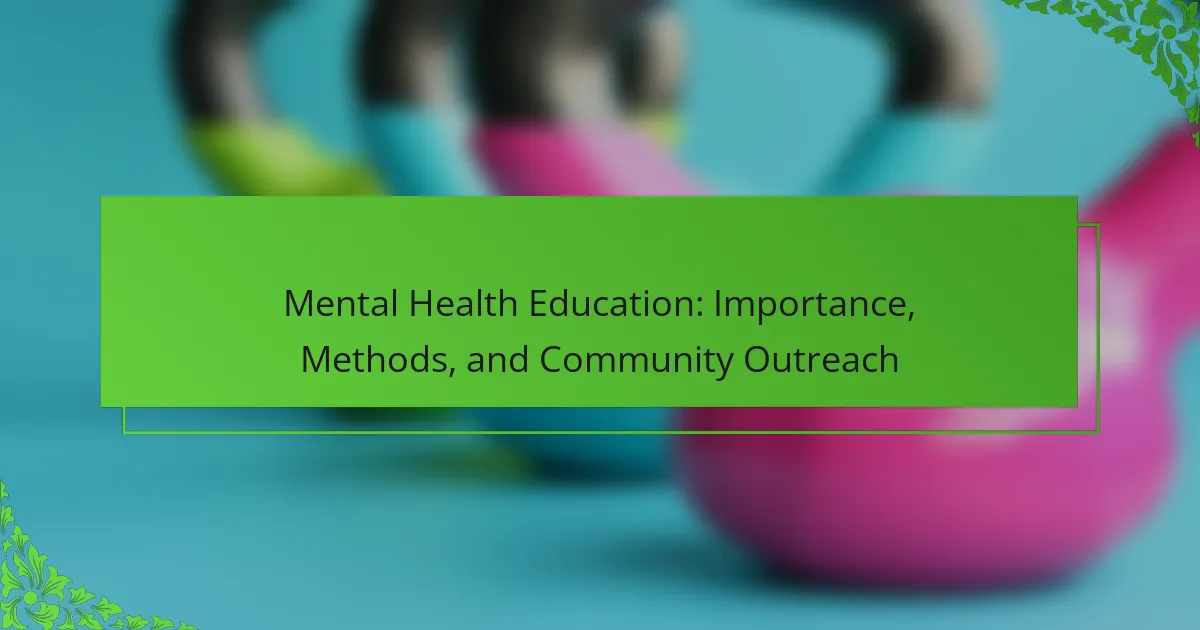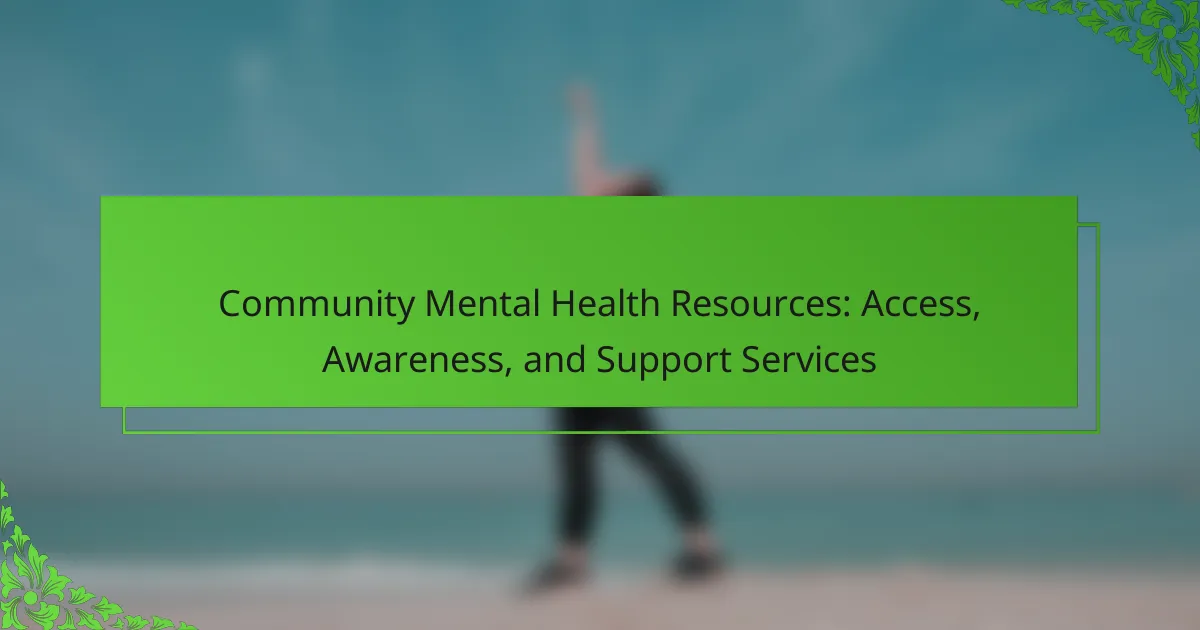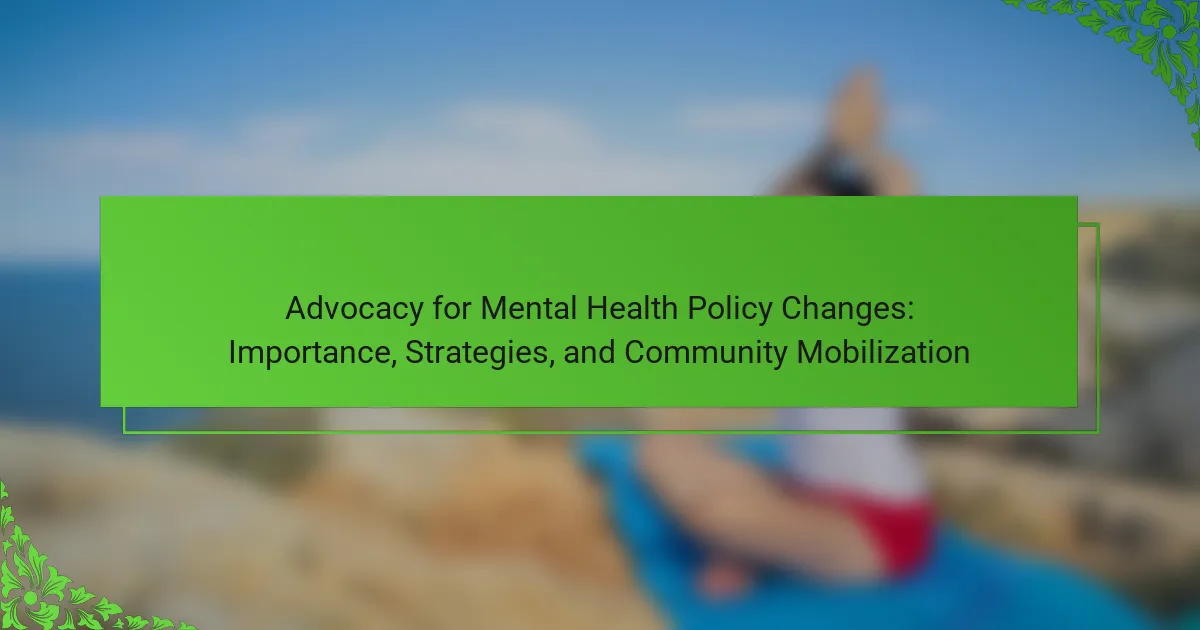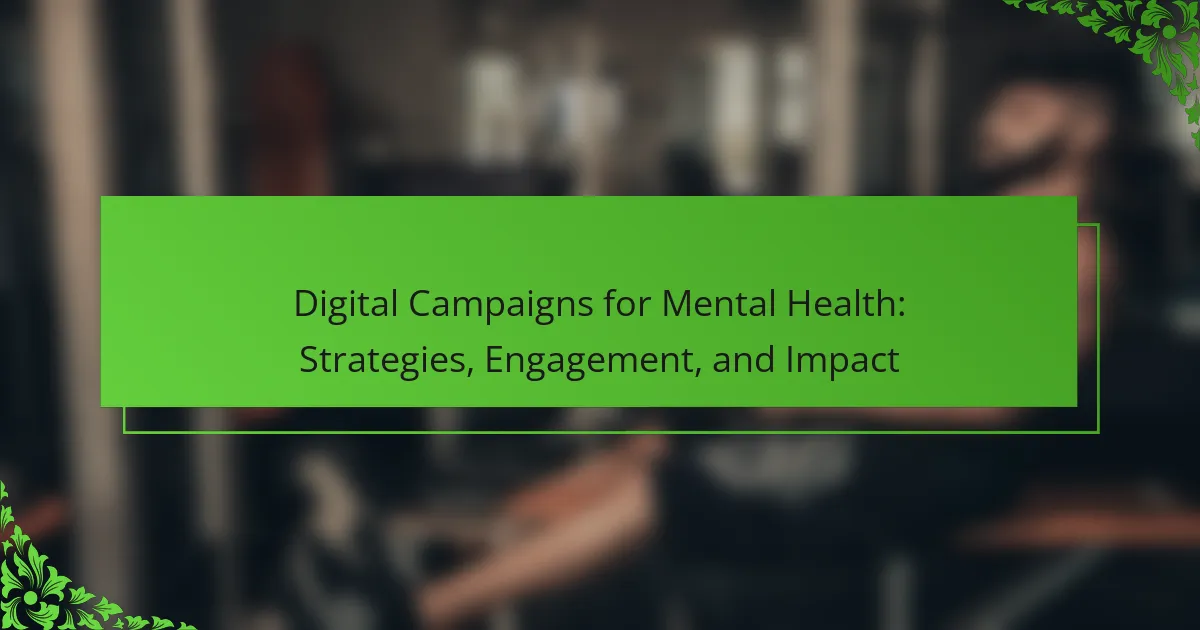Mental health education is vital for fostering awareness and reducing stigma within communities. This article explores effective methods like workshops and online courses, highlights the importance of community outreach, and discusses the role of cultural differences in educational approaches. By understanding these aspects, communities can enhance mental well-being and encourage individuals to seek help.
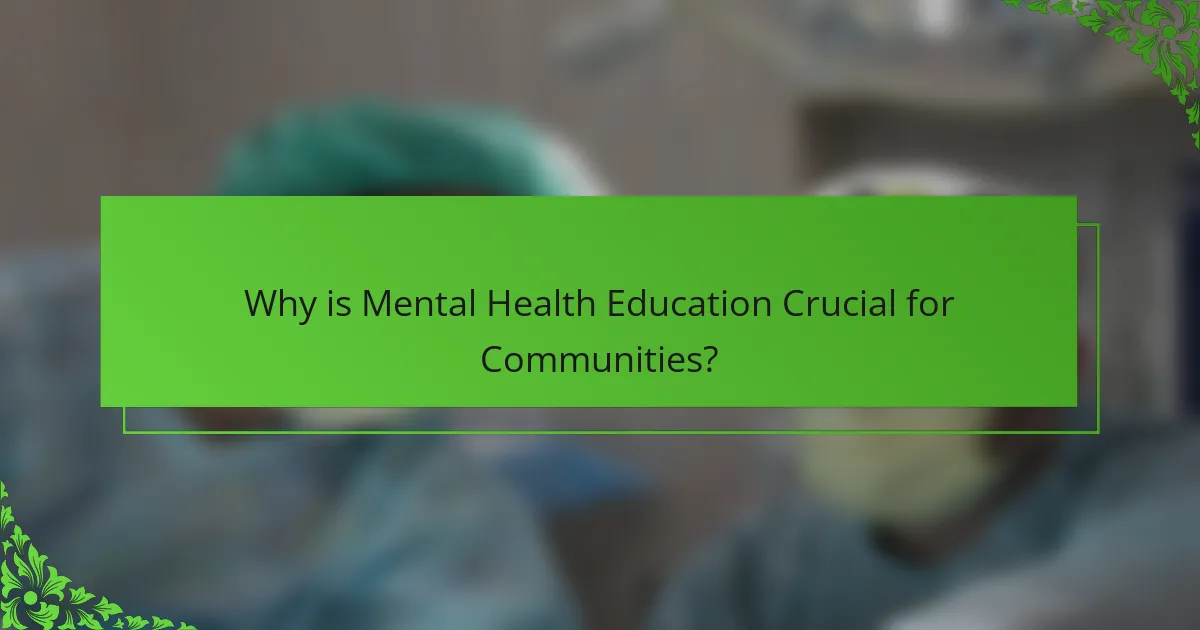
Why is Mental Health Education Crucial for Communities?
Mental health education is crucial for communities as it fosters awareness, reduces stigma, and promotes well-being. Educating individuals about mental health helps them recognize symptoms, seek help, and support others. Effective methods include workshops, school programs, and community events that engage diverse populations. As a result, communities become more resilient, leading to improved overall mental health and reduced healthcare costs.
What are the Key Benefits of Mental Health Education?
Mental health education significantly improves awareness, reduces stigma, and enhances coping strategies. It empowers individuals to recognize mental health issues and seek help. Additionally, it fosters supportive communities, promoting overall well-being. Effective methods include workshops, seminars, and online resources that reach diverse audiences. Community outreach initiatives further amplify these benefits, ensuring mental health education is accessible to all.
How Does Mental Health Education Impact Different Age Groups?
Mental health education significantly impacts various age groups by promoting awareness and resilience. Children benefit from early interventions that foster emotional intelligence, while adolescents gain coping strategies for stress. Adults often learn to manage mental health challenges, improving workplace productivity. Seniors receive support for age-related issues, enhancing their overall well-being. Each age group requires tailored methods to effectively address their unique needs and experiences.
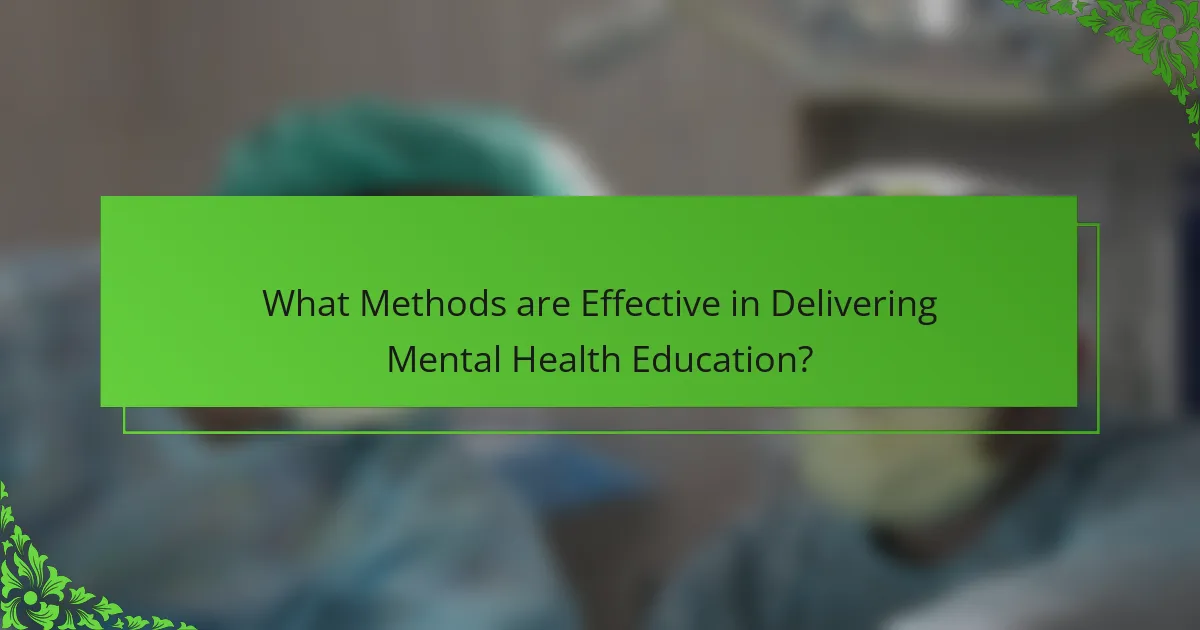
What Methods are Effective in Delivering Mental Health Education?
Effective methods for delivering mental health education include workshops, online courses, community events, and peer support programs. These approaches enhance awareness and understanding of mental health issues.
Workshops provide interactive learning experiences, allowing participants to engage directly with experts. Online courses offer flexible access to information, accommodating diverse learning styles. Community events foster social connections and reduce stigma by promoting open discussions. Peer support programs leverage shared experiences to create supportive environments.
Each method plays a crucial role in improving mental health literacy and encouraging individuals to seek help.
Which Teaching Approaches are Most Engaging for Students?
Engaging teaching approaches for mental health education include interactive methods that foster participation. Techniques such as experiential learning, project-based learning, and collaborative discussions enhance student involvement. These methods promote critical thinking and allow students to connect personal experiences with mental health topics. Incorporating technology, like virtual simulations, can also increase engagement by providing immersive learning experiences.
How Can Technology Enhance Mental Health Education?
Technology can significantly enhance mental health education by providing accessible resources and interactive learning experiences. Digital platforms allow for real-time communication and support, fostering community engagement. Online courses and apps offer tailored content, addressing individual needs and preferences. Virtual reality can simulate therapeutic environments, enhancing understanding of mental health challenges. Additionally, data analytics can track progress and outcomes, informing better educational strategies.
What Role Do Online Platforms Play in Mental Health Awareness?
Online platforms significantly enhance mental health awareness by providing accessible education, community support, and resources. They foster connections among individuals, enabling sharing of experiences and reducing stigma. Social media campaigns and online forums serve as vital tools for outreach and engagement, reaching diverse audiences. Studies show that online resources can increase knowledge about mental health issues, empowering individuals to seek help and support.
What are the Challenges in Implementing Mental Health Education Programs?
Implementing mental health education programs faces several challenges. Key issues include funding constraints, stigma surrounding mental health, lack of trained educators, and insufficient community engagement.
Funding constraints hinder the development and sustainability of programs. Stigma can deter participation and open discussions about mental health. The shortage of trained educators limits the effectiveness of the curriculum. Finally, insufficient community engagement reduces awareness and support, impacting program reach and impact.
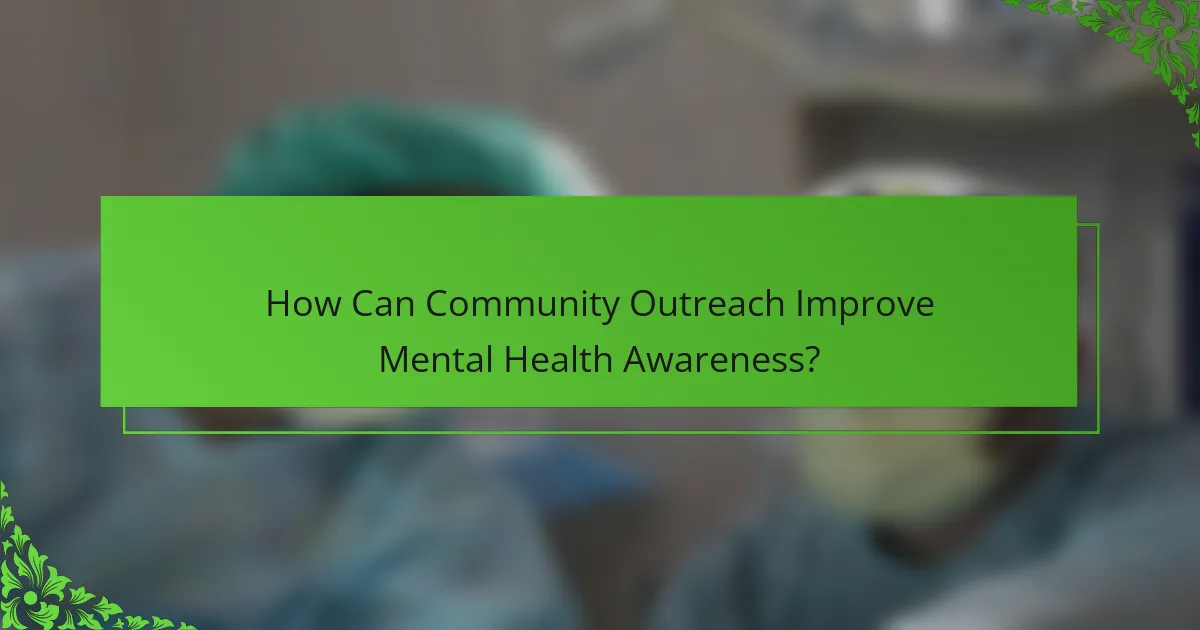
How Can Community Outreach Improve Mental Health Awareness?
Community outreach can significantly enhance mental health awareness by fostering connections and providing education. Engaging local communities through workshops and seminars promotes understanding and reduces stigma. For example, outreach programs can increase knowledge about mental health resources, leading to earlier interventions. These initiatives also encourage discussions, making mental health a community priority. As a result, individuals may feel more supported and less isolated, ultimately improving overall mental well-being.
What Strategies Foster Community Involvement in Mental Health Education?
Community involvement in mental health education is fostered through collaboration, outreach programs, and awareness campaigns. Engaging local organizations enhances resource sharing and builds trust. Workshops and seminars increase knowledge and reduce stigma. Additionally, social media platforms can amplify messages, reaching broader audiences effectively. Community feedback is essential for tailoring initiatives to meet specific needs.
Which Organizations Lead Successful Mental Health Outreach Initiatives?
Organizations leading successful mental health outreach initiatives include the National Alliance on Mental Illness (NAMI), Mental Health America (MHA), and the Substance Abuse and Mental Health Services Administration (SAMHSA). These entities focus on education, advocacy, and community support to promote mental health awareness. NAMI offers peer support programs, while MHA provides resources for prevention and early intervention. SAMHSA emphasizes public health approaches to mental health services. Each organization plays a vital role in reducing stigma and increasing access to mental health resources.
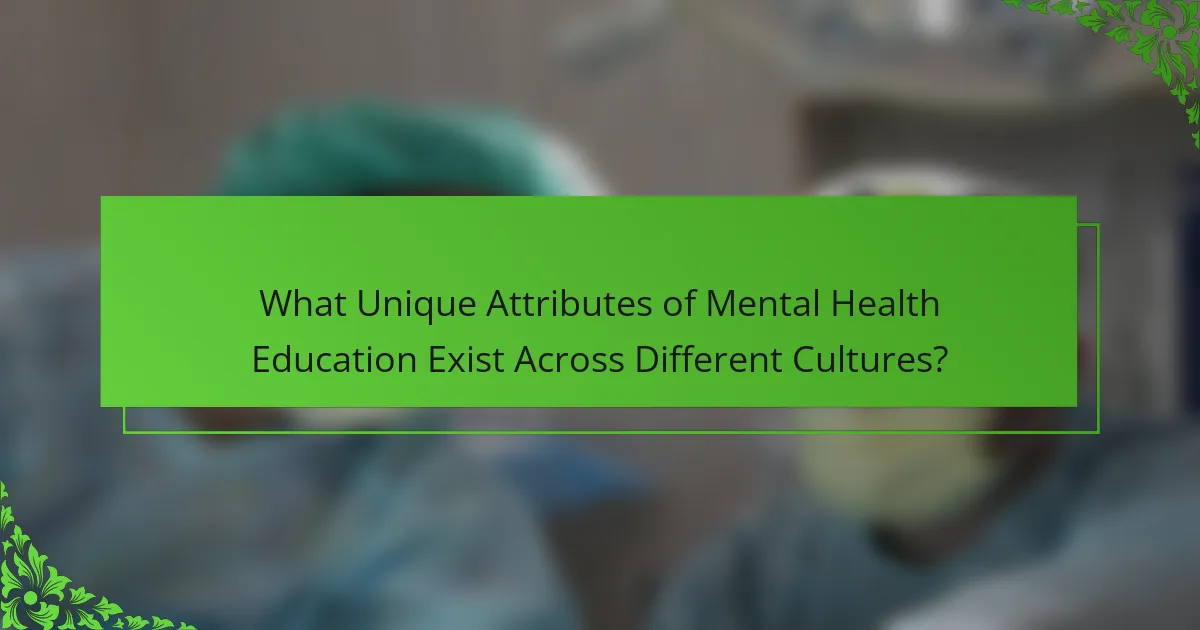
What Unique Attributes of Mental Health Education Exist Across Different Cultures?
Unique attributes of mental health education vary significantly across cultures, reflecting diverse values and beliefs. These attributes include teaching methods, community involvement, and stigma reduction strategies.
For example, collectivist cultures often emphasize community-based approaches, integrating family and social networks into mental health education. In contrast, individualistic cultures may focus more on personal responsibility and self-help strategies.
Additionally, certain cultures may prioritize traditional healing practices alongside formal education, blending modern psychology with indigenous knowledge. This unique integration can enhance acceptance and effectiveness in mental health education.
Finally, language and communication styles play a crucial role in how mental health concepts are conveyed, affecting understanding and engagement in different cultural contexts.
How Do Cultural Perspectives Shape Mental Health Education Approaches?
Cultural perspectives significantly influence mental health education approaches by shaping beliefs, practices, and communication styles. Diverse cultures may prioritize different aspects of mental health, leading to varied educational methods. For instance, collectivist cultures often emphasize community support, while individualistic cultures may focus on personal responsibility. Tailoring mental health education to reflect these cultural nuances enhances engagement and effectiveness. Additionally, incorporating local traditions and values fosters trust and acceptance, ultimately improving mental health outcomes across communities.
What Rare Yet Impactful Practices Have Emerged in Mental Health Education?
Innovative practices in mental health education include peer-led support groups, mindfulness-based interventions, and digital mental health platforms. These approaches foster community engagement and provide accessible resources.
Peer-led support groups empower individuals to share experiences, reducing stigma and enhancing understanding. Mindfulness-based interventions improve emotional regulation and resilience, benefiting participants’ overall well-being. Digital platforms offer scalable solutions, increasing reach and engagement, particularly among younger populations.
These rare practices significantly impact mental health education by promoting inclusivity and accessibility.
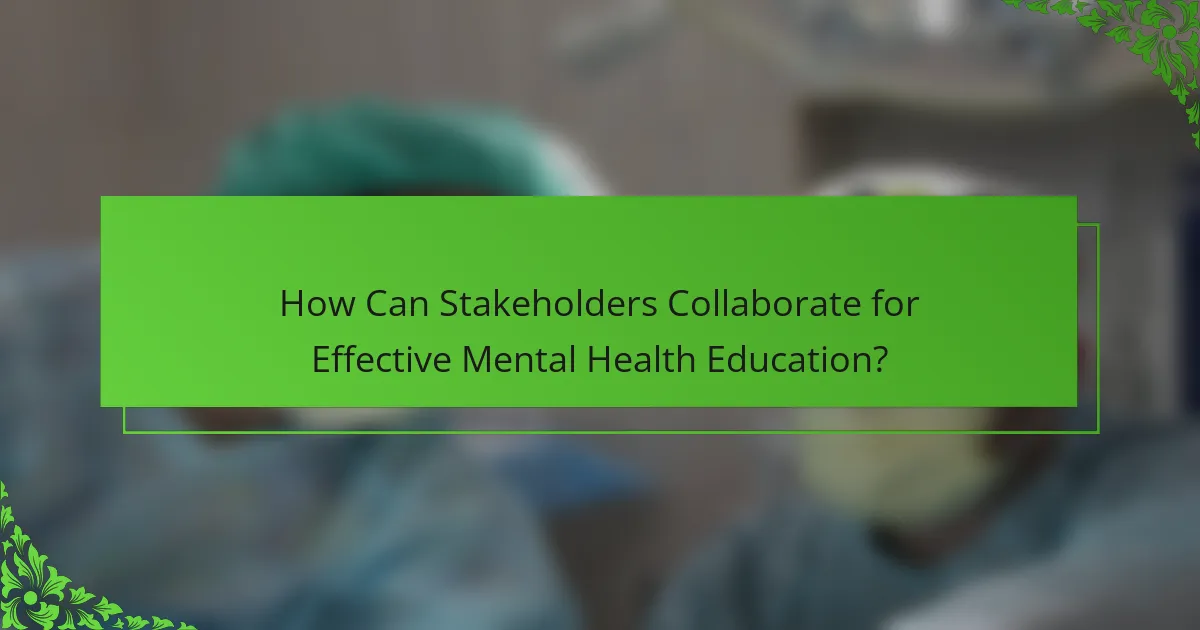
How Can Stakeholders Collaborate for Effective Mental Health Education?
Stakeholders can collaborate effectively for mental health education by sharing resources, expertise, and strategies. Collaboration fosters a comprehensive approach, enhancing community outreach and impact.
Key methods include forming partnerships between schools, healthcare providers, and local organizations. This can lead to joint workshops and training sessions that equip individuals with essential knowledge. Regular communication among stakeholders ensures alignment on goals and messaging.
Data shows that community-based programs significantly improve mental health literacy. For instance, a study found that schools implementing collaborative mental health initiatives saw a 30% increase in student awareness.
Involving diverse stakeholders, such as parents and mental health professionals, enriches the educational content. This collaboration addresses various community needs, ultimately leading to more effective mental health education.
What Roles Do Schools, Parents, and Local Governments Play?
Schools, parents, and local governments play crucial roles in mental health education. Schools provide structured programs and resources to support students’ mental well-being. Parents contribute by fostering open communication and awareness at home. Local governments facilitate community outreach initiatives and partnerships that enhance mental health resources. Together, these entities create a supportive environment that promotes mental health awareness and education.
Which Partnerships are Most Beneficial for Outreach Programs?
Collaborative partnerships with schools, healthcare providers, and community organizations are most beneficial for outreach programs in mental health education. Schools offer direct access to students, while healthcare providers can facilitate expert knowledge and resources. Community organizations enhance local engagement and trust, fostering a supportive environment for mental health initiatives. These partnerships combine resources, expertise, and networks, amplifying the impact of outreach efforts.
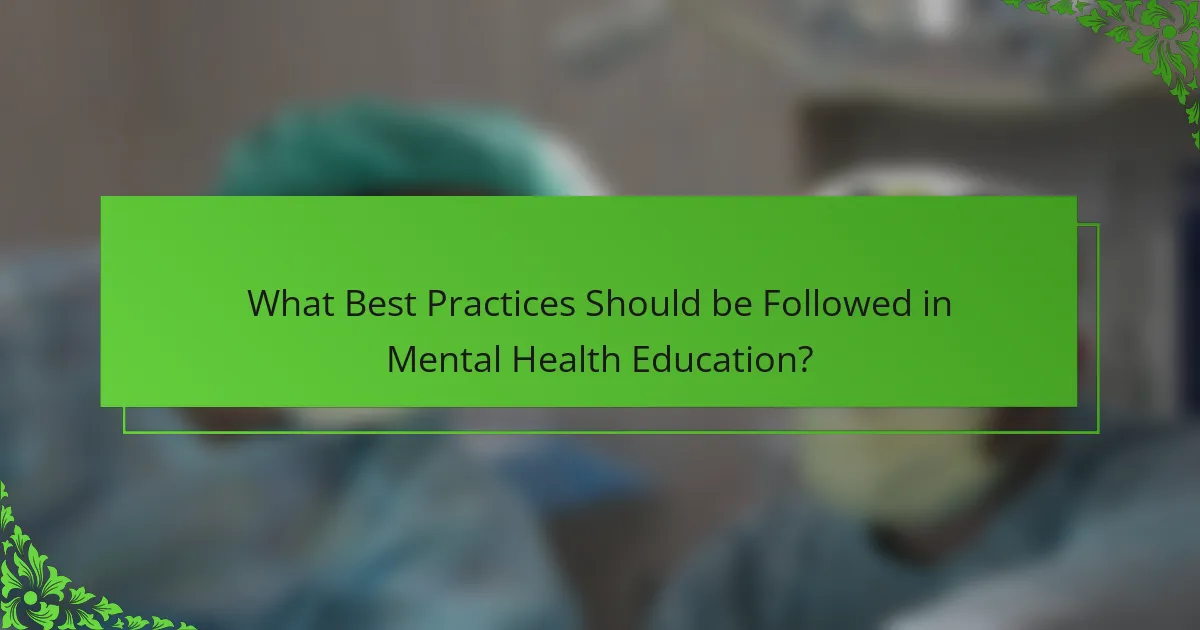
What Best Practices Should be Followed in Mental Health Education?
Effective mental health education should prioritize evidence-based practices, community involvement, and accessibility. Engaging the community fosters trust and encourages participation. Utilizing diverse teaching methods, such as workshops and online resources, enhances understanding. Regular evaluation of programs ensures they meet community needs and adapt to changing circumstances.
What Common Mistakes Should Be Avoided in Program Implementation?
To ensure effective program implementation in mental health education, avoid these common mistakes.
1. Lack of clear objectives: Define specific goals to guide the program’s direction.
2. Insufficient stakeholder engagement: Involve community members and professionals to enhance relevance and support.
3. Ignoring cultural differences: Tailor content to respect diverse backgrounds and perspectives.
4. Inadequate training for facilitators: Provide comprehensive training to ensure effective delivery of the program.
5. Failure to evaluate outcomes: Implement ongoing assessment to measure effectiveness and make necessary adjustments.
How Can Feedback Loops Enhance Program Effectiveness?
Feedback loops significantly enhance program effectiveness by facilitating continuous improvement. They allow educators to assess the impact of mental health initiatives, adapt strategies, and better meet community needs. Regular feedback from participants informs program adjustments, ensuring relevance and engagement. This iterative process fosters a responsive educational environment, ultimately leading to improved mental health outcomes.
